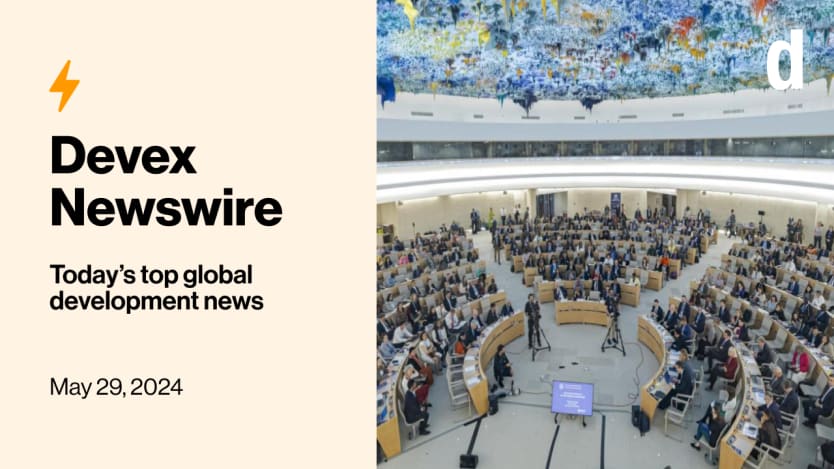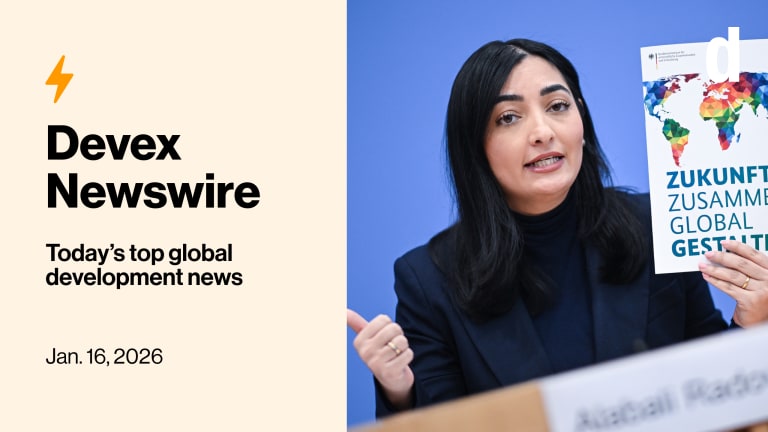
From the seemingly moribund pandemic treaty to the rip-roaring Pandemic Fund to a vaccine-skeptic taxi driver, we have all the highs and lows from the 77th World Health Assembly in Geneva.
Where to go from here?
A week? Three months? Two years?
No one really knows how long it will take for talks on the battered and bruised pandemic treaty to resume after the International Negotiating Body failed to reach consensus last Friday on a draft that supporters hoped would have been adopted at this week’s World Health Assembly. That’s assuming the talks — which have already consumed the last two years — ever even pick back up.
INB co-chair Roland Driece, speaking at the Devex CheckUp @ WHA 77 event yesterday, distilled the next steps down to two paths: “You can either continue with the aim of finishing it, or you could stop it,” he told my colleague Jenny Lei Ravelo.
This is a preview of Newswire
Sign up to this newsletter for an inside look at the biggest stories in global development, in your inbox daily.
Based on what he’s heard so far, he said the member states of the World Health Organization are opting for a continuation. What the timeframe looks like, however, is up in the air. Driece, for one, is adamant it shouldn’t be this week.
“The chances of finishing the discussions during the WHA are in my view zero,” he said, although he also pointed out that the world is not starting from zero either.
“You started with a blank sheet of paper. And if you see where we are now, I think we have all the elements on the table,” he said. “If countries want to work with them, they can work with them. So I think that's a major step.”
“But a treaty is still a piece of paper. It's not Harry Potter's magical wand that changes around the whole world by adopting it,” he cautioned. “This is a starting point.”
Read: Will the pandemic treaty get more time, or will it go down the toilet?
+ Before Friday’s decision, Jenny spoke with K.M. Gopakumar, legal adviser for the Third World Network, an independent international nonprofit network that advocates for the needs of people from the global south, about the contentious issues in the negotiations and how opposition to the pandemic treaty in some countries impacted the process. Listen to the podcast episode.
In high demand
As the pandemic treaty struggles to stay afloat, the Pandemic Fund is struggling to keep up with demand.
Despite initial hesitation among lower-income countries that housing a Pandemic Fund within the World Bank — where higher-income countries wield considerable power — would put them at a disadvantage, the fund seems to be plowing ahead.
In fact, it’s on a mission to raise an additional $2 billion over the next two years, an essential goal as it launches a five-year strategy to close gaps in global pandemic preparedness.
“We already raised $2 billion in the first year, and now we're asking for $2 billion more [for our short-term pledging moment] to help bridge the needs that we have until we get on to a more sustainable financing pathway,” Priya Basu, executive head of the Pandemic Fund secretariat, told Jenny ahead of WHA.
Still, $2 billion won’t cover the funding requests generated by its first call of proposals. For its second round of financing, which recently closed, the fund received requests of over $4.5 billion covering 140 countries.
Read: Pandemic Fund eyes $2B funding target to kick-start new strategic plan
Background reading: Where does the Pandemic Fund stand in its second year? (Pro)
+ A Devex Pro membership gives you access to all our expert analyses, funding data, globaldev’s largest job board, exclusive events, networking opportunities at our summits, and more. Not a Pro member yet? Start your 15-day free trial today.
Big plans
Speaking of strategic plans, vaccine alliance Gavi is launching its own five-year plan that aims to boost the organization’s impact and efficiency, Devex Senior Editor Helen Murphy writes.
Dr. Sania Nishtar, who took the helm of Gavi just nine weeks ago, gave us a sneak peek into her focus areas during the Devex CheckUp @ WHA 77 event.
Her priorities include scaling innovations, simplifying grantmaking, empowering local stakeholders, and enhancing global coordination for seamless vaccine delivery. Gavi is also playing the long game, looking ahead to the next 20 to 50 years to harness scientific advancements for “underprivileged populations.”
One significant advancement is coming up soon: The launch of Gavi’s African Vaccine Manufacturing Accelerator, geared toward helping the continent achieve vaccine sovereignty.
Read: Gavi, the Vaccine Alliance, has no 'magic wand,' says new CEO
Related: Gavi needs a ‘new playbook’ to deliver impact, experts say (Pro)
Wild ride
Gavi’s mandate to immunize the world is no easy feat. But it’s made that much harder by the animosity some people harbor toward vaccines — something my colleague Sara Jerving got a taste of firsthand.
Driving through Geneva, she told her taxi driver that she was in town for the World Health Assembly. He replied that vaccines are dangerous, people get weird symptoms after taking them, and that the COVID-19 pandemic originated as a malicious act, some form of biological warfare.
It was a stark reminder of the disconnect between the conversations happening at the world's highest-level health convening and the conversations happening in many communities where mistrust, misinformation, and a lack of faith in health systems abound.
The taxi driver dropped Sara off at where Nishtar’s panel was held. There, the Gavi CEO said the global health community needs to better connect with the people it serves. She gave the example of a woman bringing her child to a health facility.
“She’s not interested in Gavi, in the Global Fund, and WHO, and the rest of us in the global space. She’s only interested that her child gets better,” she said. “We need to make things work for that woman.”
+ For on-the-ground updates from WHA77, follow my colleagues Rumbi Chakamba, Jenny, and Sara on the social media platform X.
Sorry to disturb
Before appearing at his own Devex panel, Githinji Gitahi said he was so disturbed by the event’s title — Global goals, local gains: How can institutions empower communities? — that he looked at a Cambridge dictionary before hopping on stage.
Gitahi, the CEO of Amref Health Africa, double-checked the definition of the word “empower” and said he was not happy with what he found.
“The word empower means authorize. License. Entitle. Allow,” said Gitahi. “You can never act on behalf of communities. What we need to do is take the community voice and amplify it.”
Angela Chaudhuri, the chief catalyst at the nonprofit Swasti, agreed — but at the same time, the title provided ammunition for both her and Gitahi to push their points.
“I thought it was clever because I think the room wants to know where this conversation is going,” Chaudhuri laughed.
The start of the event made for localization in a nutshell: a tightrope walk between power, and who really has the authority to shift it. And despite all the talk on localization, Gitahi said, we’re not there yet. He pointed to the upcoming launch of Gavi’s African Vaccine Manufacturing Accelerator, a $1 billion initiative that will provide financial incentives to scale up vaccine production on the African continent. It’s an enormous investment — but its launch is taking place in Paris.
“The traditional charity model was built on this concept of communities who are disenfranchised have no dignity, and therefore we are going to help them,” Gitahi said. “For us to make that shift, we have to give up our power. And I think that is the difficulty of localization. Giving up power makes us feel vulnerable.”
In the panel before Gitahi’s, the CEO said he asked Nishtar why the accelerator’s launch was happening in France.
“She whispered, ‘Oh I wish I could change it,’” Gitahi said. “But that tells you that we don’t give up power.”
In other news
Garry Conille, UNICEF’s regional director for Latin America and the Caribbean, has been named Haiti’s new prime minister. [AP News]
The U.S.-built aid pier off Gaza’s shore has been damaged by rough seas and weather and is expected to take at least a week to repair. [BBC]
Climate change has resulted in 26 extra days of extreme heat in the last 12 months, according to a report by the Climate Central, the Red Cross Red Crescent Climate Centre, and World Weather Attribution. [CNA]
Sign up to Newswire for an inside look at the biggest stories in global development.








